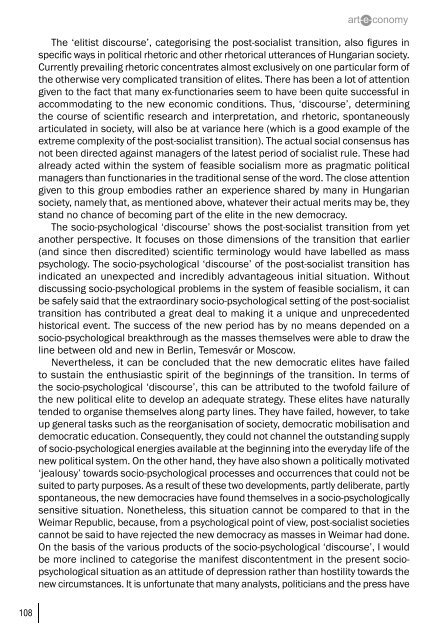art-e-conomy _ reader - marko stamenkovic
art-e-conomy _ reader - marko stamenkovic
art-e-conomy _ reader - marko stamenkovic
You also want an ePaper? Increase the reach of your titles
YUMPU automatically turns print PDFs into web optimized ePapers that Google loves.
108<br />
The ‘elitist discourse’, categorising the post-socialist transition, also figures in<br />
specific ways in political rhetoric and other rhetorical utterances of Hungarian society.<br />
Currently prevailing rhetoric concentrates almost exclusively on one p<strong>art</strong>icular form of<br />
the otherwise very complicated transition of elites. There has been a lot of attention<br />
given to the fact that many ex-functionaries seem to have been quite successful in<br />
accommodating to the new economic conditions. Thus, ‘discourse’, determining<br />
the course of scientific research and interpretation, and rhetoric, spontaneously<br />
<strong>art</strong>iculated in society, will also be at variance here (which is a good example of the<br />
extreme complexity of the post-socialist transition). The actual social consensus has<br />
not been directed against managers of the latest period of socialist rule. These had<br />
already acted within the system of feasible socialism more as pragmatic political<br />
managers than functionaries in the traditional sense of the word. The close attention<br />
given to this group embodies rather an experience shared by many in Hungarian<br />
society, namely that, as mentioned above, whatever their actual merits may be, they<br />
stand no chance of becoming p<strong>art</strong> of the elite in the new democracy.<br />
The socio-psychological ‘discourse’ shows the post-socialist transition from yet<br />
another perspective. It focuses on those dimensions of the transition that earlier<br />
(and since then discredited) scientific terminology would have labelled as mass<br />
psychology. The socio-psychological ‘discourse’ of the post-socialist transition has<br />
indicated an unexpected and incredibly advantageous initial situation. Without<br />
discussing socio-psychological problems in the system of feasible socialism, it can<br />
be safely said that the extraordinary socio-psychological setting of the post-socialist<br />
transition has contributed a great deal to making it a unique and unprecedented<br />
historical event. The success of the new period has by no means depended on a<br />
socio-psychological breakthrough as the masses themselves were able to draw the<br />
line between old and new in Berlin, Temesvár or Moscow.<br />
Nevertheless, it can be concluded that the new democratic elites have failed<br />
to sustain the enthusiastic spirit of the beginnings of the transition. In terms of<br />
the socio-psychological ‘discourse’, this can be attributed to the twofold failure of<br />
the new political elite to develop an adequate strategy. These elites have naturally<br />
tended to organise themselves along p<strong>art</strong>y lines. They have failed, however, to take<br />
up general tasks such as the reorganisation of society, democratic mobilisation and<br />
democratic education. Consequently, they could not channel the outstanding supply<br />
of socio-psychological energies available at the beginning into the everyday life of the<br />
new political system. On the other hand, they have also shown a politically motivated<br />
‘jealousy’ towards socio-psychological processes and occurrences that could not be<br />
suited to p<strong>art</strong>y purposes. As a result of these two developments, p<strong>art</strong>ly deliberate, p<strong>art</strong>ly<br />
spontaneous, the new democracies have found themselves in a socio-psychologically<br />
sensitive situation. Nonetheless, this situation cannot be compared to that in the<br />
Weimar Republic, because, from a psychological point of view, post-socialist societies<br />
cannot be said to have rejected the new democracy as masses in Weimar had done.<br />
On the basis of the various products of the socio-psychological ‘discourse’, I would<br />
be more inclined to categorise the manifest discontentment in the present sociopsychological<br />
situation as an attitude of depression rather than hostility towards the<br />
new circumstances. It is unfortunate that many analysts, politicians and the press have


